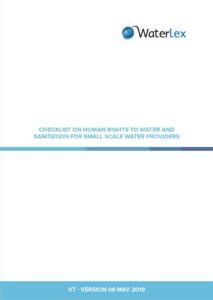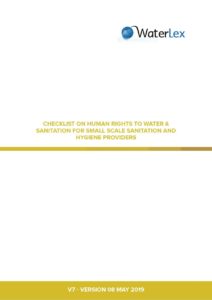Lista de verificación sobre los derechos humanos al agua y al saneamiento para proveedores de pequeña escala
Objetivo de estas listas de verificación
El objetivo de estas listas de verificación es proporcionar una herramienta de autoevaluación basada en los derechos humanos para proveedores o empresarios informales que prestan servicios en los sectores del agua (camiones de agua, tuberías verticales, operadores de quioscos, servicios de suministro de agua a pequeña escala, sistemas de tratamiento de agua domésticos, organizaciones comunitarias de agua y saneamiento, etc.) y en los sectores de saneamiento e higiene (camiones de recolección de desechos, tratamiento de desechos de saneamiento, eliminación de productos de higiene menstrual, recolección y tratamiento, servicios de mantenimiento, servicios y tratamiento de recolección de desechos domésticos, etc.). Estas listas de verificación tienen como objetivo ayudar a estos empresarios a llevar a cabo su actividad comercial en cumplimiento de los derechos humanos.
Al exhortar a los proveedores a cumplir con los derechos humanos al agua y al saneamiento, mejora su impacto positivo, incluido un aumento de su poder económico y político (integración en marcos de desarrollo más amplios, posibilidad de asociarse con instituciones más grandes y otros beneficios). También proporciona a las empresas sociales una herramienta para medir el impacto.
What are the human rights to safe drinking water and sanitation?
In 2010, the UN General Assembly declared the right to drinking water and sanitation as essential to the full enjoyment of life and all human rights. In 2015, the UN General Assembly reaffirmed the right to water and the right to sanitation, recognising them as distinct rights, although related and both stemming from the right to an adequate standard of living. Human rights obligations related to access to water and sanitation are included in different human rights treaties. It is States that are primary responsible for the realisation of the human rights to water and sanitation.
The human rights to water and sanitation entitle everyone to have access to sufficient, safe, acceptable, physically accessible and affordable water for personal and domestic use, while the right to sanitation entitles everyone to have physical and affordable access to sanitation, in all spheres of life, that is safe, hygienic, secure, and socially and culturally acceptable and that provides privacy and ensures dignity. Those rights shall be delivered in a participatory, accountable and non-discriminatory manner.
Who has a human right to safe drinking water and sanitation?
Human rights are the inalienable fundamental rights to which each person is inherently entitled. Human rights are conceived as universal (applicable everywhere) and egalitarian (the same for everyone). They embody the basic standards without which people cannot realize their inherent human dignity. Recognising access to safe drinking water and sanitation as a human right therefore means that everybody is entitled to these rights.
What are the human rights to water and sanitation principles and criteria?
Human rights criteria (availability, quality, acceptability, accessibility and affordability) and human rights principles (non-discrimination, access to information, participation, accountability and sustainability) shape the content and scope of the right and guide its implementation process. All these elements give meaning to the human rights to water and sanitation and must be taken into account for its implementation.
Why do human rights matter to small scale water providers?
The United Nations Human Rights Council (2011) endorsed the Guiding Principles on Business and Human Rights: Implementing the United Nations ‘Protect, Respect and Remedy’ Framework. These Guiding Principles apply to all States and to all business enterprises, NGOs and community-based organisations regardless of their size, sector, location, ownership and structure.
The Guiding Principles recognise that:
- States have the obligation to respect, protect and fulfil human rights;
- Business enterprises and other suppliers/operators are required to comply with all applicable laws and need to respect human rights. They should avoid infringing on the human rights of others and should address adverse human rights impacts with which they are involved; and
- Rights and obligations need to be matched by appropriate and effective remedies when breached.
This means small scale water operators have to comply with local laws and are responsible to respect human rights, including the rights to access to safe drinking water and sanitation.
Responsibilities of non-State service providers
Non-State actors must comply with the laws and regulations of the country in terms of a general legal obligation: they have a basic responsibility to respect human rights. The distinctive responsibilities of companies in relation to human rights are summarised under the concept of ‘due diligence’. Companies are required to exercise due diligence in relation to human rights while operating. ‘This concept describes the steps a company must take to become aware of, prevent and address adverse human rights impacts’[1].
Private enterprises in the water and sanitation sectors
Private enterprises will need to comply with the due diligence framework. At the same time, the provision of water and sanitation services is characterised by a special feature: the services relate directly to the fulfilment of human rights. Thus, while private enterprises may contribute to the realisation of the rights to water and sanitation, the activities of services providers may also potentially result in abuses of the right to water and sanitation. The following special challenges have been identified considering the human rights-based approach in the water sector[2]:
- Guaranteeing transparent and democratic decision-making
- Addressing power asymmetries in the bidding and negotiation process
- Reaching the poorest and the most marginalised
- Ensuring affordable services
- Avoiding disconnections in case of inability to pay
- Ensuring the quality of services
- Ensuring monitoring and follow up
- Ensuring effective complaint mechanism
- Addressing corruption
IMPORTANT NOTICE: this document is a self-assessment for notice only and does not engage its authors in any kind of liabilities. It has been designed for small scale organisations acting in the field of access to water only. Meeting the criteria does not replace a full human rights due diligence process, but only introduces a human rights-based approach to thinking. For a process including a full human rights due diligence process, or for further information, please contact Human Right 2 Water.
[1] Protect, Respect and Remedy: a Framework for Business and Human Rights Report of the Special Representative of the Secretary-General on the issue of human rights and transnational corporations and other business enterprises, John Ruggie A/HRC/8/5.
[2] Report of the independent expert on the issue of human rights obligations related to access to safe drinking water and sanitation, Catarina de Albuquerque A/HRC/15/31


